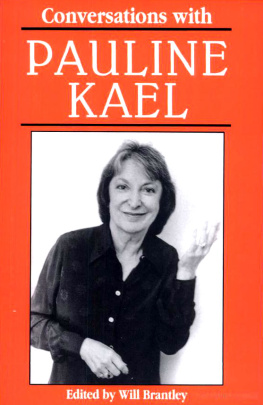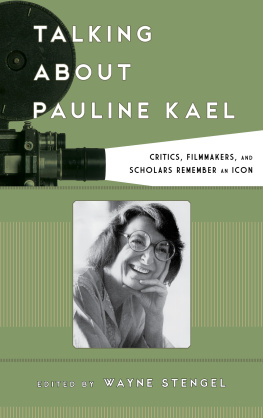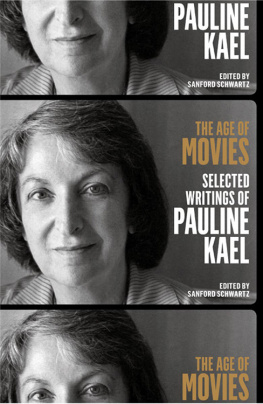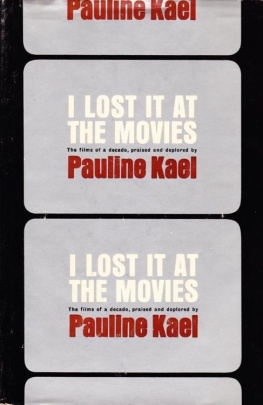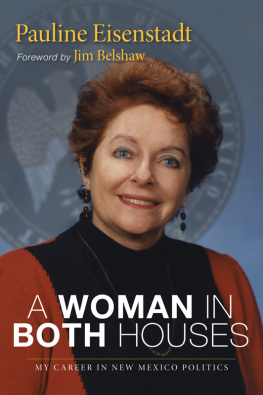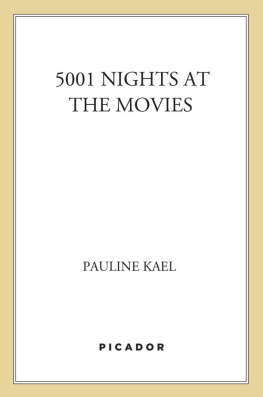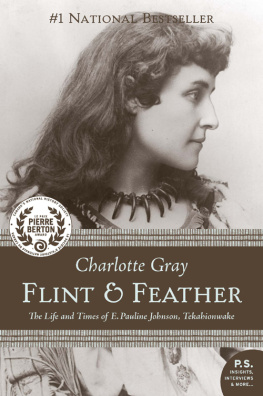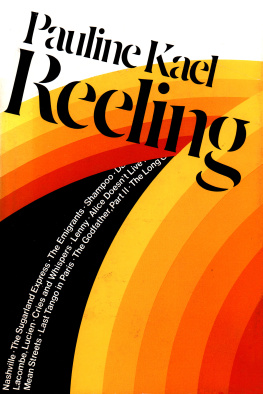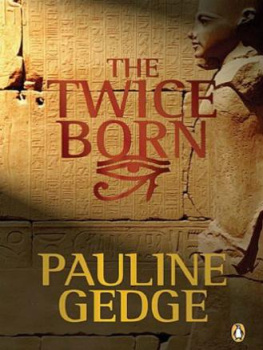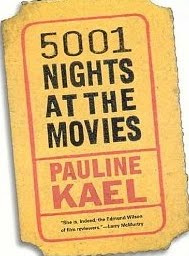Kael Pauline - Conversations with Pauline Kael
Here you can read online Kael Pauline - Conversations with Pauline Kael full text of the book (entire story) in english for free. Download pdf and epub, get meaning, cover and reviews about this ebook. City: Jackson, year: 1996, publisher: University of Mississippi Press, genre: Art. Description of the work, (preface) as well as reviews are available. Best literature library LitArk.com created for fans of good reading and offers a wide selection of genres:
Romance novel
Science fiction
Adventure
Detective
Science
History
Home and family
Prose
Art
Politics
Computer
Non-fiction
Religion
Business
Children
Humor
Choose a favorite category and find really read worthwhile books. Enjoy immersion in the world of imagination, feel the emotions of the characters or learn something new for yourself, make an fascinating discovery.
- Book:Conversations with Pauline Kael
- Author:
- Publisher:University of Mississippi Press
- Genre:
- Year:1996
- City:Jackson
- Rating:5 / 5
- Favourites:Add to favourites
- Your mark:
- 100
- 1
- 2
- 3
- 4
- 5
Conversations with Pauline Kael: summary, description and annotation
We offer to read an annotation, description, summary or preface (depends on what the author of the book "Conversations with Pauline Kael" wrote himself). If you haven't found the necessary information about the book — write in the comments, we will try to find it.
Conversations with Pauline Kael — read online for free the complete book (whole text) full work
Below is the text of the book, divided by pages. System saving the place of the last page read, allows you to conveniently read the book "Conversations with Pauline Kael" online for free, without having to search again every time where you left off. Put a bookmark, and you can go to the page where you finished reading at any time.
Font size:
Interval:
Bookmark:
The Kael cult, the Kael phenomenon: call it what you will, but Pauline Kaelis a critic whose work has deeply mattered. Since her retirement fromregular reviewing in 1991, and with the publication in 1994 of ForKeeps: Thirty Years at the Movies, Kaels large body of writing hasbeen the subject of several appreciations and critical examinations. In aprovocative piece in The Yale Review, Jed Perl makes thisassessment: For those of us who opened the New Yorker everyweek or every other week for months and years at a time, looking to see whatKael had reviewed, how she had approached it, what exactly she had to sayweknew, even as the weeks were passing, that we were living in a golden age ofcriticism. InArtforum, Greil Marcus offers a similar response, one thatparallels my own. Marcuss immediate focus is Kaels first collection,I Lost it at the Movies:
I look back to Kaels bookor, really, carry it with me, as I have since1966, when I first read itbecause like few books of criticism before orsince it pays its promise in full: You must use everything you are andeverything you know. On page after page Kaels writing moves as if tomatch that pledge, to test its limits. The result, for a reader, isntadmiration or envy. It can be a kind of wonder: what would it feel like towrite like thatto feel that alive?
Marcus adds that many people other than himself are still trying to findout.
Of course not all readers have shared the reactions of Perl and Marcus. Kaelhas generated her share of controversy. Yet even Renata Adlers bitterattack in a 1980 issue of The New York Review of Books isevidence of Kaels cultural significance. Few other twentieth-centurycritics have elicited anything like the response accorded to Kael; writersranging from Norman Mailer to Alfred Kazin to John Podhoretz have feltcompelled to respond to her intensely felt reviews. Speaking on behalf ofother critics at a recent awards ceremony, Sheila Benson, formerly ofThe Los Angeles Times, said that [Kael], more than anyone,made us aware of the voice in a review. Believe me, for writers who foundtheir footing in the Seventies and Eighties, the hardest thing wasnot to sound like Pauline.
Kael would, however, disparage the role of icon. She has in fact been one ofthe most consistently accessible of major writers. Over the years I have runinto people who told me that they once wrote to Pauline Kael about somethingor other and that, to their surprise, she wrote back. As she points out inmany of these interviews, Kael has relished all but the occasional hate mailthat she has received throughout her career. She has also relished the factthat for more than twenty years she brought younger readers to The NewYorker and that, more often than not, she wrote against the tastes ofa sophisticated and literate readership. Even prior to her retirement, aconsensus view had emerged: Kaels relationship with The NewYorker is one of the most successful liaisons of twentieth-centuryjournalism. As Mark Feeney observes in his feature interview for TheBoston Globe Magazine, Mismatched though the patrician NewYorker and pugnacious Kael may have seemed, the marriage turned outto have been made in magazine heaven. It was Fred Astaire and Ginger Rogersall over again: The magazine gave her class, she gave it sexappeal.
Given that she has stressed the democratic nature of movies (she called themour national theatre in her prefacing remarks to Deeper intoMovies), it is no surprise that Kael has been democratic in herresponse to requests for interviews. She has talked with studentpublications, with little magazines, with professional journals, with thebig weeklies and monthly slicks, with daily and alternative newspapers, andwith magazines for special audiences. This collection brings together overhalf of Kaels published interviews, many of which were conducted by otherwell established journalists and critics. The selections are not limited toconventional question-answer pieces; included also are feature articlesbased on interviews, a transcript of a 1981 debate between Kael and Jean-LucGodard (its great fun to see these two spar with one another), and acollege newspapers account of a less cantankerous conversation between Kaeland Jonathan Demme that took place in 1988.
In her celebrated essay Trash, Art, and the Movies, Kael argues that theromance of movies is found at least in part in the adolescent dream ofmeeting others who feel as you do about what youve seen. You do meet them,of course, and you know each other at once because you talk less about goodmovies than about what you love in bad movies. As a movie lover (whocan miss the eroticism in the titles of her books?), Kael also loves thetalk that is a major part of moviegoing; and as anyone who has seen her in aquestion-answer session will affirm, Kael can cover a dense terrain in justone short hour.
Kael gave a number of interviews in the late sixties and early seventiesduring the years when she was becoming a national figure. She gaverelatively few in the mid to late seventies, though she did lecturefrequently at universities during these years. Since her Hollywood venturein 1979, a steady stream of interviews has appeared, with an average ofabout one each year. Though even some of the best interviewers bring uptopics that Kael has covered repeatedly, she still responds openly and withcare to even the most obvious questions (a perennial favorite is how manytimes do you see a movie?; Kaels response is always the same: once). Inkeeping with the conventions of the University Press of MississippisLiterary Conversations Series, I have not deleted repetitions among theinterviews. Anyone reading the collection from start to finish will see thateach conversation, whatever its repetition of another piece, is valuablewithin itself.
It is suggestive of Kaels approach to the film medium that one of the firstpieces included here concerns not movies but books. In Portrait of a WomanReading, Kael makes the claimone that might surprise her less attunedreadersthat books are more important to her than movies: I could livewithout movies much more easily than I could live without books, which wouldalmost seem like a form of death. Kael goes on to make the kind ofobservation that, in the manner of H. L. Mencken or Dorothy Parker, hasdrawn attention to her unfailing ability to deflate the powerful and thepretentious. You can see what living without books does when you talk tomovie producers who depend on synopses, she tells Ann Geracimos; Despitethe power and money, theyre tiresome people. I asked someone recently why acertain rich old director went on working, and the explanation was becauseno one would talk to him if he werent in a position of power. Thats thefate of bookless people; they bore each other with anecdotes. Kael is oftenrequired to spell out what should be obvious, that she is passionate aboutall the arts. In fact, one of her favorite questions is: what do you doother than review movies?
An early question-answer session with Leo Lerman inMademoiselle (Lerman was not credited when the piece appeared)is suggestive of Kaels importance as a social commentatoras a critic ofculture as well as film. Pauline Kael Talks About Violence, Sex, Eroticismand Women & Men in the Moviesthe title of Kaels conversation withLerman contains the subjects that have drawn many readers to her criticism.Interviewers in particular have known that Kael can be counted on to respondto these topics in ways that fly in the face of received opinion and thatprompt viewers to re-examine how their reactions to a film may have beenshaped by its initial hype. In her New Yorker interview withHal Espen, for instance, Kael discusses the sexual politics of the popularThelma & Louise, which she calls a revenge movie forwomen that distorts the issues it poses much as the Charles BronsonDeath Wish movies used to. Its a peculiarlyclass-unconscious movie, she asserts, and its doomsday finish strikesher as muddleheaded at best: The women punish men by killingthemselvestheyre heading for an all-girl heaven.
Font size:
Interval:
Bookmark:
Similar books «Conversations with Pauline Kael»
Look at similar books to Conversations with Pauline Kael. We have selected literature similar in name and meaning in the hope of providing readers with more options to find new, interesting, not yet read works.
Discussion, reviews of the book Conversations with Pauline Kael and just readers' own opinions. Leave your comments, write what you think about the work, its meaning or the main characters. Specify what exactly you liked and what you didn't like, and why you think so.

